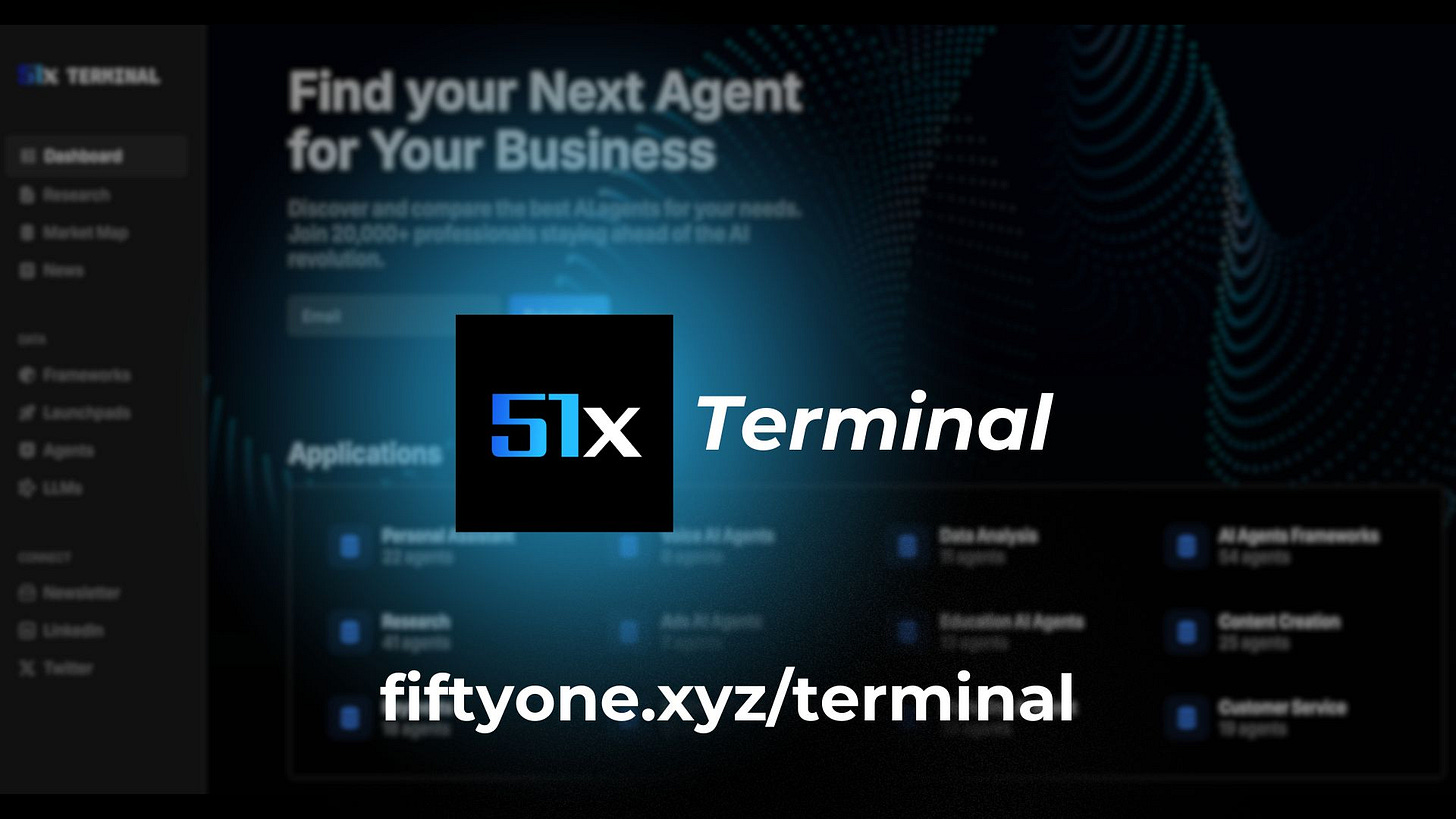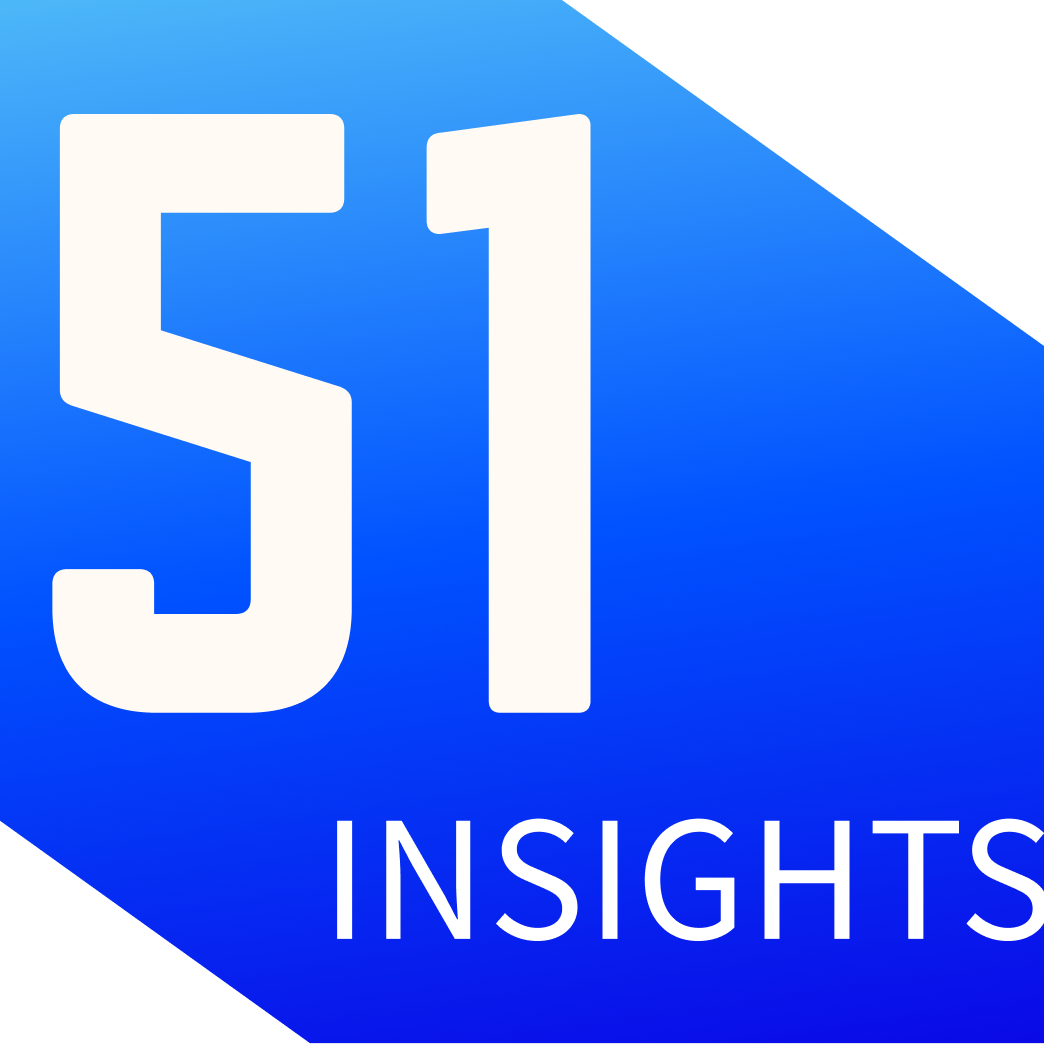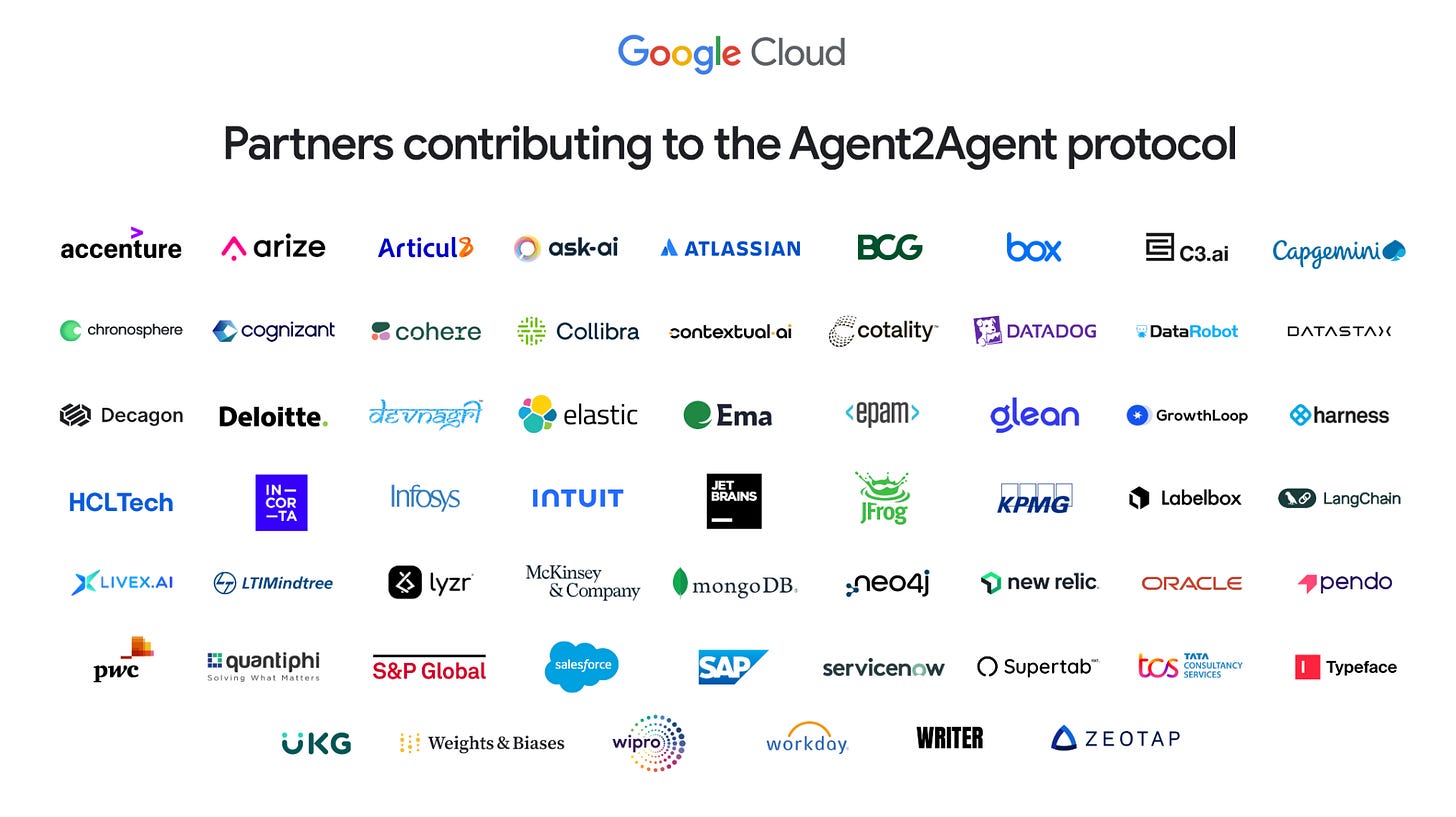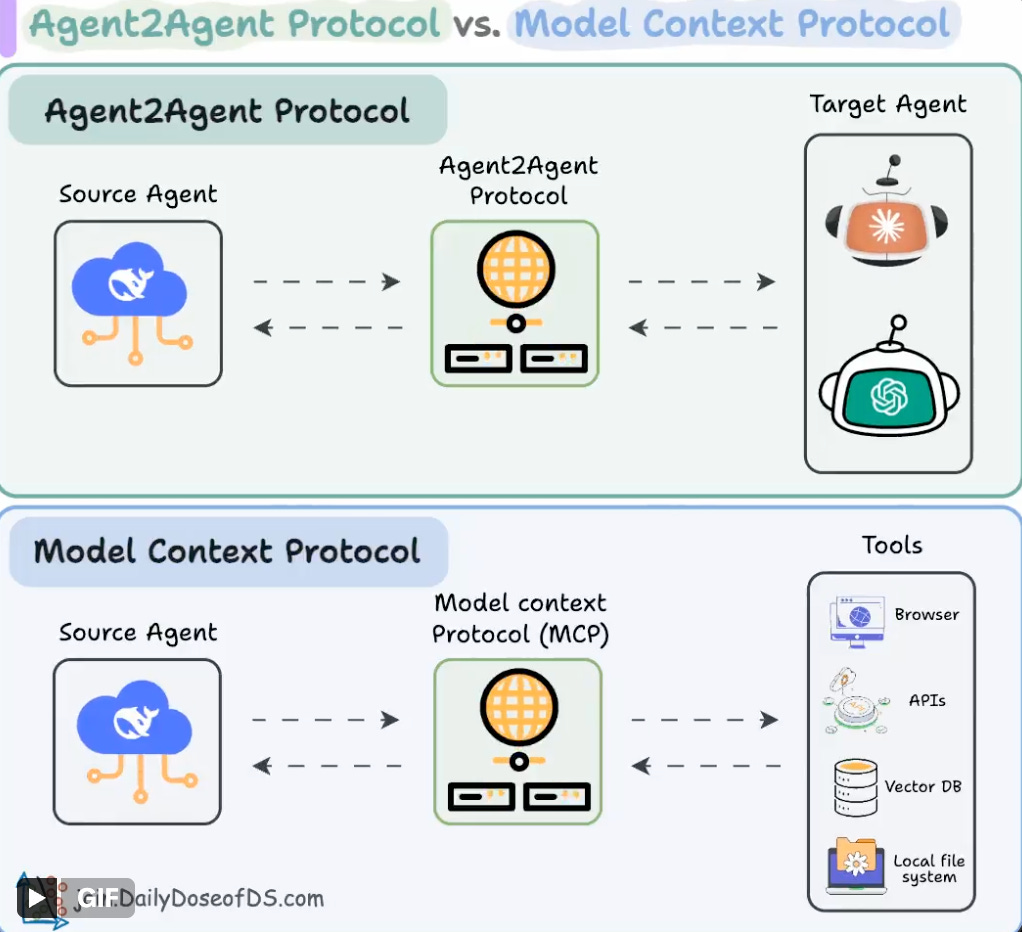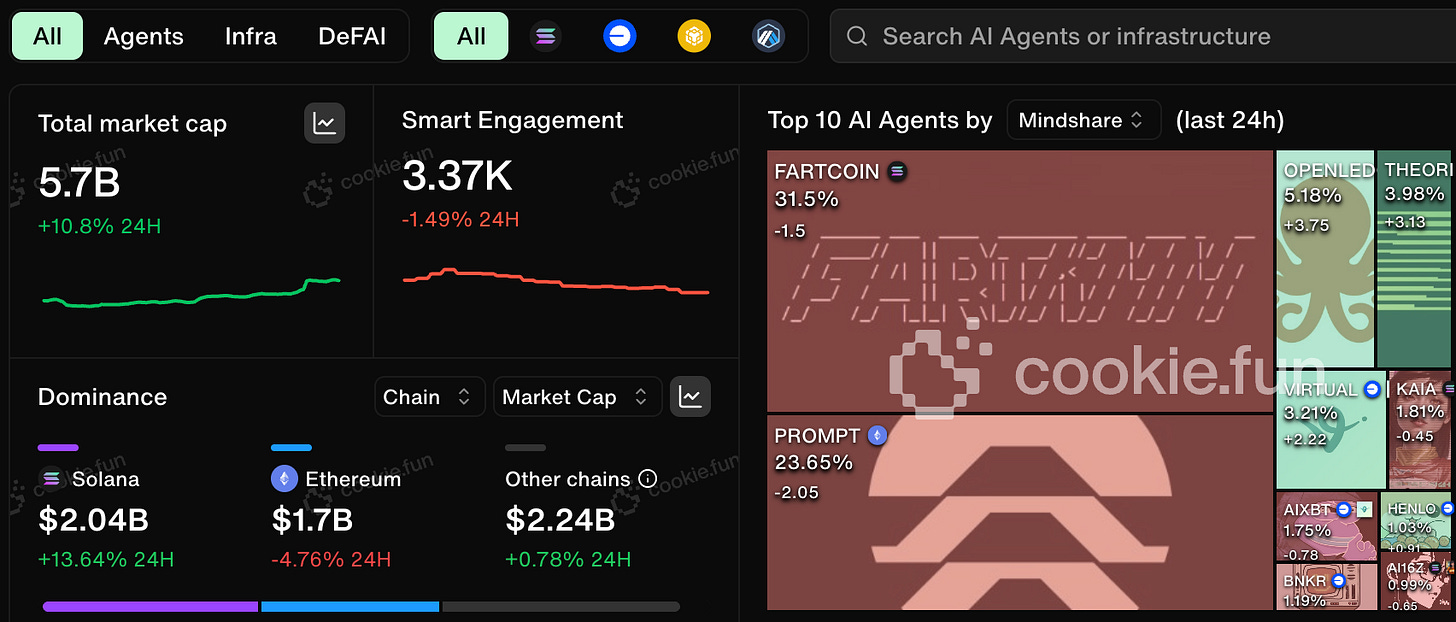#9: Google's Agent Bombshell
Plus: Top reads, alpha, Google's new agent-to-agent protocol, and more.
Hi there, it’s Marc.
AI agents are finally learning to work together.
Google launched A2A, an open protocol that lets AI agents from different platforms talk to each other, delegate tasks, and share data securely. It’s backed by Salesforce, PayPal, Deloitte, and more.
If it takes off, A2A could solve one of the biggest headaches in enterprise AI: making tools from different vendors actually play nice.
Google is on a roll. Recently, they launched:
Agentspace: A platform for deploying and managing AI agents across enterprise systems.
Agent Development Kit (ADK): An open-source toolkit to build and deploy multi-agent applications.
Agent2Agent (A2A) Protocol: An open standard enabling AI agents from different vendors to communicate and collaborate.
Also this week:
Sentient AGI claims it beats GPT-4o in AI search
Akash integrates LLaMA 4 Maverick (400B parameters)
GaiaNet crosses 300K self-hosted AI nodes
VIRTUAL gets listed on Binance
A lot’s happening across the agent stack — from infrastructure to interoperability.
Let’s dive in 👇
The Ultimate Vendor Intelligence Platform
Discover, compare, and track AI vendors in real time — powered by research and data, not hype. Join the waitlist for exclusive early access 👉
Top Reads
Google’s A2A vs MCP. Link
The $10T cost of ChatGPT's economic advice, and AI governance. Link
Voice AI & Voice Agents: An Illustrated Primer. Link
MCP is going wild. Link
Multi Agent Solution for Customer Churn Prediction using Gen AI. Link
MCP: USB-C for AI. Link
The Model Context Protocol (MCP): The Ultimate Guide. Link
Alpha
Sentient AGI announced Open Deep Search (ODS), claiming it outperforms Perplexity and ChatGPT in AI search, with 75.3% accuracy on DeepMind’s FRAMES benchmark and 88.3% on SimpleQA, surpassing GPT-4o Search Preview by ~10% on FRAMES.
Akash Network integrated Llama 4 Maverick,a multimodal AI model with 400 billion total parameters, in AkashChat.
DeTrip, a blockchain travel platform, integrates AIDEN (formerly IQ GPT), an AI chatbot by IQ AI, to provide quick, accurate answers for its community on hotel bookings and travel experiences using crypto or traditional payments.
Arbius V5, launched on Arbitrum, enables a decentralized AI network where users can deploy open-source AI models, vote on them, and use GPU power to mine $AIUS tokens, requiring 420 $AIUS to start as a miner.
VIRTUAL will be listed on Binance.
GaiaNet_AI announced surpassing 300,000 nodes ( individual points in a network running Gaia’s AI agent service, downloadable via GitHub (GaiaNet-AI/gaianet-node), where users can host AI models like LLaMA).
Fetch launched web search on ASI-1 Mini, a Web3-native large language model (LLM) designed for agentic AI.
Partnerships:
Morpheus integrated Smart Agents with Akash Network. Smart Agents are autonomous AI entities that can self-fund their operations on permissionless networks like Akash, addressing issues like censorship and service interruptions common in centralized systems such as AWS.
Mira Network partners with Storacha to solve AI's data reliability issues by integrating decentralized storage, ensuring verifiable and immutable data for autonomous AI workflows.
EMC Protocol and Decentralized Intelligence (DI) partners to advance decentralized AI (DeAI) by combining EMC’s decentralized storage and compute infrastructure with DI’s Web3 AI framework.
Hybrid and GAIB are collaborating to merge AI and blockchain, with Hybrid creating on-chain AI agents for autonomous trading and GAIB tokenizing GPU infrastructure to turn computing power into yield-bearing assets.
Token Metrics partnered with Heurist AI, integrating Token Metrics' AI-driven market data into Heurist's serverless agent network for enhanced real-time crypto analytics.
Virtuals Protocol partners with VaderAI to improve agent-based launches, addressing structural issues like fundraising and sniping that hinder builders in the Web3 AI ecosystem.
👉Enjoying 51x? Subscribe to our Web3 newsletter for business leaders
Google Announces Agent2Agent (A2A) Protocol
Google’s Agent2Agent (A2A) protocol (open-source) enables AI agents to communicate across platforms, regardless of framework or vendor, using standards like HTTP and JSON-RPC with enterprise authentication.
Why it matters: This could be one of the missing pieces for real AI scale —solving a major pain point in enterprise AI: interoperability. A2A lets AI agents collaborate, even if they’re built by different vendors.
Zooming in:
A2A lets AI agents work together, share data, and delegate tasks securely.
Backed by 50+ partners like Salesforce and PayPal, it aims to be the internet protocol layer for AI.
Key features:
Cross-Agent Collaboration: Agents from Salesforce, SAP, etc., can now work together—e.g., sourcing, scheduling, and background checks in hiring—automating complex workflows.
Boosted Efficiency: By standardizing agent interactions, A2A cuts integration costs and increases productivity, backed by support from Accenture, Deloitte, and more.
Developer-Friendly: Built on HTTP, SSE, and JSON-RPC, it’s easy to adopt and extend—fully open-source and community-driven.
Secure & Versatile: Enterprise-grade security and support for text, audio, and video make A2A ready for real-world, multi-modal applications.
A2A vs MCP: A2A and MCP are complementary, not competitive,MCP connects agents to data. A2A connects agents to each other. Together, they form a powerful AI ecosystem—agents access resources via MCP and coordinate via A2A.
Punchline: With big players backing it and strong security, A2A could become the go-to standard. But its success will depend on adoption, flexibility, and how well Google keeps the momentum going.
More links:
Top AI Agents by mindshare
Some agents you want to keep an eye on:
$VIRTUAL ($364M): A framework and infrastructure designed to create, deploy, and monetize autonomous AI agents across various platforms and applications, such as gaming, entertainment, social interactions, and more.
$TRAC ($182M): A decentralized knowledge-sharing protocol and blockchain-based platform that uses a Decentralized Knowledge Graph (DKG) to organize, verify, and share trusted data and knowledge assets across industries.
$AI16Z ($150M): Solana-based web3 platform that employs a unique AI agent-driven VC investment model and community-driven DAO governance.
$FAI ( $117M): AI built with publicly available large language models (LLMs) and operates on the Base blockchain.
$PAAL ($111M): Personalized, advanced AI assistants and applications, particularly for crypto investors and broader digital communities.
$PHA ($73M): A decentralized blockchain platform focused on providing secure, privacy-preserving computation for Web3 applications.
$AIXBT ($69M): A crypto-savvy AI that scans markets and social media to deliver trading insights and alpha opportunities.
$OLAS ($44M): Decentralized platform for creating and managing autonomous AI agents, enabling co-ownership and operation of off-chain services like automation and oracles.
That’s it for now.
– Marc & team






